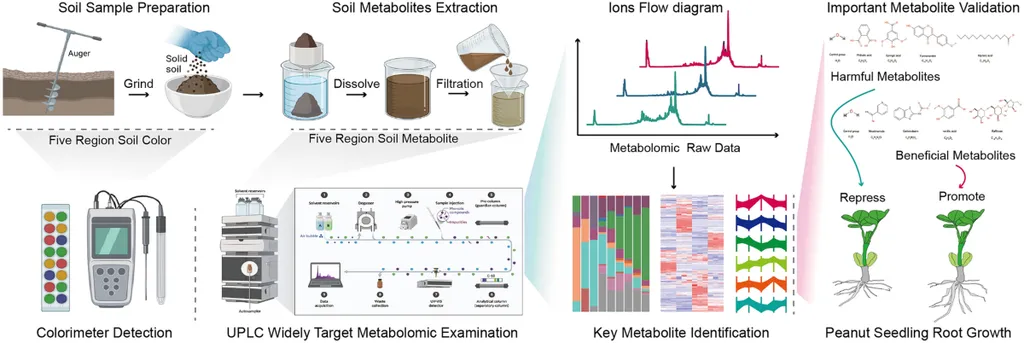In the heart of Guangdong, China, a groundbreaking study led by Lingling Wu at the Crops Research Institute of the Guangdong Academy of Agricultural Sciences is unearthing the secrets of soil metabolites and their profound impact on peanut root growth. This research, recently published in the journal “Chemical and Biological Technologies in Agriculture” (translated as “化学与生物技术在农业中的应用”), is not just about peanuts; it’s about revolutionizing precision agriculture and potentially boosting crop yields worldwide.
Wu and her team have identified a treasure trove of soil metabolites that can either stimulate or inhibit root growth in peanuts. By profiling 702 soil-specific metabolites across five different regions, they pinpointed 118 differentially expressed metabolites. Among these, ten were selected for validation, revealing a fascinating dichotomy: four root-promoting metabolites and four phytotoxic compounds.
The results were striking. Seedlings treated with nicotinamide, carbendazim, vanillic acid, and raffinose showed a remarkable 28.3% increase in root elongation compared to untreated seeds. On the other hand, phthalic acid, myristic acid, formononetin, and syringic acid suppressed root growth by a staggering 56.6%. “The hierarchical efficacy among these metabolites was particularly intriguing,” Wu noted. “Carbendazim emerged as the most potent enhancer, while formononetin was the most potent suppressor.”
So, what does this mean for the future of agriculture? Precision agriculture is all about optimizing plant growth by understanding and manipulating the environment. This research provides a biochemical basis for harnessing soil-specific metabolites to enhance root development, potentially leading to healthier, more productive crops.
The implications are vast. By identifying and utilizing these root-promoting metabolites, farmers could significantly improve crop yields. This is not just about peanuts; the principles could be applied to a wide range of crops, revolutionizing the way we grow food.
Moreover, understanding the inhibitory metabolites could help in developing strategies to mitigate their effects, further boosting agricultural productivity. As Wu puts it, “This research opens up new avenues for precision agriculture, offering a biochemical basis for enhancing root development and, ultimately, crop yields.”
In the ever-evolving landscape of agritech, this study is a beacon of innovation. It’s a testament to the power of scientific inquiry and its potential to transform industries. As we look to the future, the insights gleaned from this research could very well shape the next agricultural revolution, making it more precise, more productive, and more sustainable.

